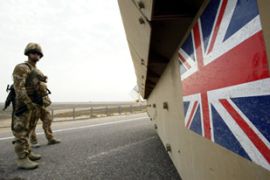UK court rules on soldiers’ rights
Human Rights Act does not apply to soldiers serving abroad, Supreme Court rules.

An inquiry in 2006 found the military had failed to recognise and take appropriate steps to address the difficulty Smith had adjusting to Iraq’s climate.
‘Astonishing finding’
Lord Rodger, one of the justices who allowed the appeal, said protection for soldiers could “never be complete”.
“Any suggestion that the death of a soldier in combat conditions points to some breach by the United Kingdom of his Article 2 right to life is not only to mistake but – much worse – to devalue what our soldiers do,” he was quoted by the Press Association.
But Jocelyn Cockburn, who represented Catherine Smith, Jason Smith’s mother in her case at the Supreme Court, said Wednesday’s decision was “shocking”.
“If you asked British soldiers whose jurisdiction they are under, they would say the United Kingdom. They are bound by and can rely on its laws, wherever
they serve in the world,” the Press Association quoted her as saying.
“Despite this, the Supreme Court has held that soldiers leave the UK jurisdiction, insofar as the Human Rights Act is concerned, when they leave a UK army base.
“It can only be hoped that the morale of soldiers who are risking their lives for us will not be severely damaged by this astonishing finding.”
Cockburn said that the issue would have to be tested in the European Court of Human Rights in Strasbourg.
Special duty
James Eadie, a Queens Counsel representing the ministry of defence, had argued at an earlier hearing in March that it would never be possible to guarantee rights under the European Convention to soldiers.
He said the reasoning of the appeal judges at the time could mean that the state had a special duty to protect soldiers from all risks, including those caused by conflict.
Eadie had added it could lead to commanders becoming less effective in tactical decision-making and weaken operational effectiveness.
John Wadham, a group legal director at the Equality and Human Rights Commission, said he was disappointed by the ruling and that soldiers should be given human rights protection.
“Soldiers are often required to lay down their life for their country and in return, should be afforded human rights protection.
“Extending human rights protection is not about individual decisions in the heat of battle, but ensuring that when we send soldiers off to war they are
properly prepared; kitted out correctly and with equipment fit for combat,” he said.